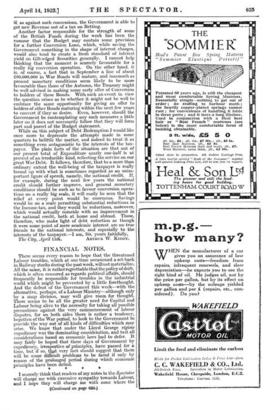FINANCE-PUBLIC & PRIVATE.
[BY OUR CITY EDITOR.]
DEBT REDEMPTION AND MARKETS.
[To the Editor of the SPECTATOR.] Stn,—It is no infrequent experience to find that the reassembling of Parliament (especially when the problems awaiting the Government's attention are more than usually formidable) proves the signal for a setback in securities. Such, however, has not been the case during the past week. The outstanding feature has been the strength of British Funds and kindred securities, but practically every department has been good, the only exception being English rails, where apprehensions of a renewal of Labour troubles occasioned a little profit- taking Among many reasons which might be given for the continued strength of Investment stocks I should still be inclined to give foremost place to what may be described perhaps as the sheer momentum resulting from the concentration not only of spare resources here but of foreign balances upon the " safety first" departments. A further explanation, however, is to be found in. favourable anticipations of the Budget statement. Whatever may be Mr. Baldwin's programme, he will have a cheerful story to relate with regard to the year that is dosed, and if he blends with zeal for Debt Redemption due discretion in encouraging industrial activity by judicious taxation remission there will be ground for encouragement as regards the outlook. As for Debt Redemption, it is hoped in the City that the Chancellor will fully restore all statutory sinking funds to their proper place as a charge against Revenue. Having once firmly established that principle he will automatically confirm and strengthen the improvement in the national Credit which has already resulted from the volume of Floating. Debt redeemed during the past year. I notice that the rough estimate of a prospective surplus of £50,000,000 to £60;000,000, which I mentioned with some trepidation last week, coincides pretty closely with some other forecasts which have since appeared, and if this surplus is attained after making all provision for sinking funds there seems- no reason why sixpence should not be- deducted front. the= Diem:nett= and some con- - cessions be made as regards indirect taxation, especially, if, as against such concessions, the Government is able to get new Revenue out of a tax on Betting.
Another factor responsible for the strength of some of the British Funds during the week has been the rumour that the Budget may contain some provision for a further Convergion Loan, which, while saving the Government something in the shape of interest charges, would also tend to create a fresh -standard of interest yield on Gilt-edged Securities generally. I cannot help thinking that the moment is scarcely favourable for a really big conversion operation. On the other hand, it is, of course, a fact that in September a line of about £80,000,000 in War Bonds will mature, and inasmuch as present monetary conditions seem likely to be more favourable than those of the Autumn, the Treasury •might be well advised in making some early offer of Conversion to holders of these Bonds. With such an event in view the question arises as to whether it might not be well to embrace the same opportunity for giving an offer to holders of other Bonds maturing within the next few years to convert if they so desire. Even, however, should the Government be contemplating any such measures a little later on it does not necessarily follow that they will form part and parcel of the Budget statement. While on this subject of Debt Redemption I would like once more to deprecate the attempts made in some quarters to belittle the matter, and indeed to treat it as something even antagonistic to the interests of the tax- payer. The plain facts of the situation are that out of our present total of Expenditure nearly one-half is at present of an irreducible kind, reflecting the service on our great War Debt. It follows, therefore, that to a more than ordinary extent the well-being of the taxpayer is really bound up with what is sometimes regarded as an unim- portant figure of speech, namely, the national credit. If, for example, during the next few years the national credit should further improve, and general monetary conditions should be such as to favour conversion opera- tions on a really big scale, it will easily be seen that the relief at every point would be enormous. Savings would be on a scale permitting substantial reductions in the Income-tax, and they would be reductions, moreover, which would actually coincide with an improvement in the national credit, both at home and abroad. Those, therefore, who make light of debt reduction as though it were some point of mere academic interest are no true friends to the national interests, and especially to the interests of the taxpayer.—I am, Sir, yours faithfully,











































 Previous page
Previous page